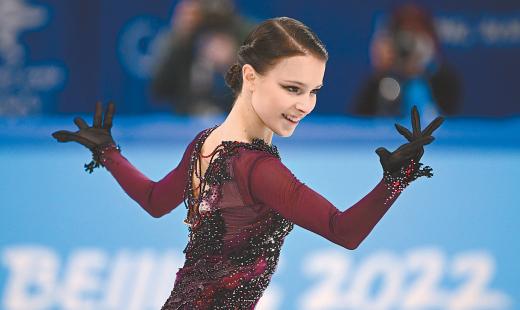[Global Times reporter Zhang Zhen strict Jin Huizhen Liu Yupeng] The Russian and Austrian teams failed to achieve the goal of "standing on the podium" in figure skating. In the women's singles free skating of the Beijing Winter Olympics that ended on the evening of the 17th, the Russian Olympic team's Serbakova and Trusova won gold and silver medals, and Japan's Hanaori Sakamoto won the bronze medal. Vallieva, who previously ranked No. 1 in the short program and was controversial due to the doping incident, played abnormally, and only finished 4th.
Russia creates the "women's four-week jump era"
NBC said that at the 2014 Winter Olympics in Sochi, 17-year-old Tornikova won the figure skating women's singles title. Since then, young Russian girls have been ruling the project. At the Pyeongchang Winter Olympics, Zagitova and Medvedeva won gold and silver medals. At the Beijing Winter Olympics, the "trio" of the Russian-Austrian team – Vallieva, Shcherbakova and Trusova – is young and dominant. Shcherbakova was exposed to skating at the age of 3 and won the World Figure Skating Championships in 2021; Trusova started skating at the age of 4 and was the first female athlete to complete the hooker's four-way jump, Philip's four-jump, rear-point ice jumping, and outer-point ice-hopping in an official competition; Vallieva began skating at the age of 3, and allegedly knew she was "destined to participate in the Winter Olympics" in kindergarten.

"In the field of figure skating, Russia has always been a world leader." According to the Russian "sports" website, Russian athletes began to apply for regional sports schools from an early age. According to the Russian "Championat" website, in the multi-functional ice rink of the elite village "Belyotsky River Village" 17 kilometers away from Moscow, there are professional training areas such as figure skating and ice hockey, providing various training conditions for Russian players leading to the Winter Olympics.
Sakamoto Hanaori does not rely on high difficulty
Before the emergence of the mighty Russian trio, only a handful of female players had tried to jump around. At the 1992 Winter Olympics in Albertville, France's Suria Bonali tried to jump around without success. ESPN analysis said that from the perspective of today's women's figure skating pattern, the four-sided jump has not been widely popularized, and striving for stability is also a way of thinking. The 21-year-old Japanese figure skating championships champion Hanaori Sakamoto previously finished 3rd in his solo short show. The Japanese media "THE ANSWER" said, "Although Sakamoto Hanori does not have a difficult jump, he can glide gracefully after the jump is completed, and only Sakamoto can do it in this competition." ”
In the view of Japanese retired figure skater Yuka Sato, one of the main reasons why Japanese players can compete with European and American players on the world stage is the "Japanese figure skating wave". Since 1992, the Japan Skating Union has held training camps, and Shizuka Arakawa, Asia's first Winter Olympic figure skating champion, is the first student of the training. Shizuka Arakawa's victory at the 2006 Winter Olympics and The fact that Masayoshi Asada, who "combines strength and appearance", finished second at the 2010 Winter Olympics changed the world of figure skating in Japan – not only attracting sponsorship investment, but also more and more Japanese girls following their example and starting to learn figure skating.
Who will succeed Kim Yeon-in?
The Global Times reporter found at the figure skating scene on the 17th that there were many more Japanese and Korean reporters in the day's event than before. After all, in the previous short program competition, two Japanese contestants (Hanori Sakamoto and Shinba Higuchi) and a Korean contestant (Liu Yong) made it into the top 6. In the free skating final on the evening of the 17th, Liu Yong finally ranked 6th. After the game, KOREAN media such as KBS TV highly praised Liu Yong's performance, "She is the first Korean female athlete to complete Axel's three-week jump on the Olympic stage."
At this Winter Olympics, the Korean figure skating women's singles event included Kim Yi-lin and Liu Yong, two players, who entered the free skating final. South Korea's "East Asia Daily" said on the 17th that in the 2010 Vancouver Winter Olympics, Kim Yeon-na won the gold medal, and another South Korean player, Guo Minting, stopped at 13th place; at the 2014 Sochi Winter Olympics, Kim Yeon-na won the silver, and another South Korean player Kim Hae-jin ranked 16th; in the 2018 Pyeongchang Winter Olympics, Choi Do-bin and Kim Ho-na finally ranked 7th and 13th respectively.
Outside the arena, the commentators of the three major South Korean television stations KBS, MBC and SBS had previously been "collectively silent" when the Russian-Austrian player Vallieva appeared in the short program, and staged the unprecedented "3 minutes of silence" scene in the history of The Korean Olympic Broadcasting, in order to protest the appearance of "drug-related" player Vallieva on the Olympic stage.